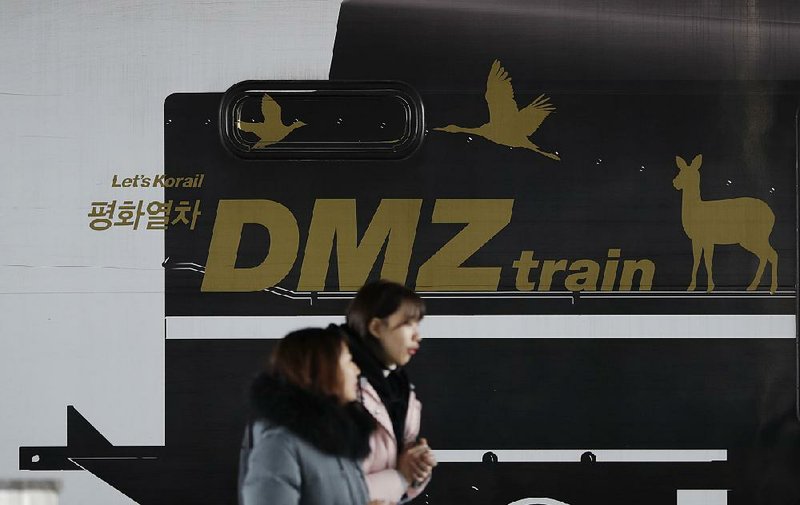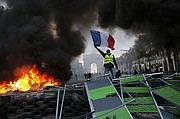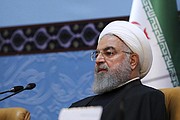Koreas plan to survey, connect railways
SEOUL, South Korea -- South Korea said Saturday that the United Nations Security Council granted an exemption to sanctions that will allow surveys on North Korean railroad sections the Koreas want to connect with the South.
The surveys would require the South to bring to the North fuel and a variety of goods, including possibly cars to test on northern tracks.
The Koreas plan to hold a groundbreaking ceremony by the end of the year on an ambitious project to connect their railways and roads as agreed by their leaders. But beyond surveys and tape-cuttings, they cannot move much further along without the lifting of U.S.-led sanctions against North Korea, which isn't likely before Pyongyang takes firmer steps toward relinquishing its nuclear weapons and missiles.
The plan to modernize North Korea's outdated railways and roads and reconnect them with the South was among many agreements reached between North Korean leader Kim Jong Un and South Korean President Moon Jae-in, who met three times this year amid a diplomatic push that eased tensions over the North's nuclear program.
Violent tax protests persist in France
PARIS -- French police fired tear gas and water cannons to disperse violent demonstrators in Paris on Saturday, as thousands gathered in the capital and beyond and staged road blockades to vent anger against rising fuel taxes.
Thousands of police were deployed nationwide to contain the eighth day of deadly demonstrations that started as protests against tax but morphed into a rebuke of President Emmanuel Macron and the perceived elitism of France's ruling class. Two people have been killed since Nov. 17 in protest-related tragedies.
At least 19 people, including four police officers, were hurt Saturday and one person had more serious injuries in the day of unrest in Paris, according to police.
Macron responded in a strongly worded tweet: "Shame on those who attacked [police]. Shame on those who were violent against other citizens ... No place for this violence in the Republic."
Interior Minister Christophe Castaner said that 8,000 protesters flooded the Champs-Elysees at the demonstration's peak and there were nearly 106,000 protesters and 130 arrests in total nationwide.
Paris deployed some 3,000 security forces on Saturday, notably around tourist-frequented areas.
Pakistan looks into India ties in attack
KARACHI, Pakistan -- The suicide bomber that targeted the Chinese Consulate in Karachi used a foreign-made C-4 plastic explosive, said Pakistani police, who suggested Saturday that the attack was orchestrated in India.
Counterterrorism officer Umar Khitab said that authorities are investigating whether Baluch separatist commander Aslam Achhu, who they believe masterminded the attack, is in India. The Baluch Liberation Army claimed responsibility for the attack, and Khitab said the group is backed by "the enemy country," a reference to India.
There was no immediate comment from India's External Affairs Ministry.
Two other Pakistani officials said four suspects, who allegedly facilitated the three attackers, were arrested in Karachi and other Sindh province towns. They spoke on condition of anonymity because they were not authorized to brief media.
Friday's attack on the Chinese Consulate in Karachi triggered an intense shootout that left all three assailants, two police officers and two civilians dead.
Iranian leader calls Israel 'fake regime'
TEHRAN, Iran -- Iran's President Hassan Rouhani on Saturday called Israel a "cancerous tumor" established by Western countries to advance their interests in the Middle East.
Iran's leaders frequently condemn Israel and predict its demise, but Rouhani, a relative moderate, rarely employs such rhetoric.
Addressing an annual Islamic Unity Conference on Saturday, Rouhani said "one of the ominous results of World War II was the formation of a cancerous tumor in the region." He went on to refer to Israel as a "fake regime" set up by Western countries.
Israeli Prime Minister Benjamin Netanyahu responded later Saturday, saying, "Rouhani's slander, which calls for the destruction of Israel, proves yet again why the nations of the world need to join in the sanctions against the Iranian terrorist regime which threatens them."
Iran supports militant groups like Hezbollah and Hamas that are pledged to Israel's destruction. Iran has never threatened to attack Israel, but has vowed to retaliate if it is attacked. Israel views Iran as an existential threat.
Rouhani said the United States cultivates close ties with "regional Muslim nations" to protect Israel, an apparent reference to Iran's regional rival Saudi Arabia and the kingdom's Sunni Arab allies. He said bowing to American pressure amounts to "treason."
A Section on 11/25/2018


